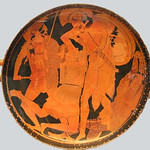"Blowing the dust off the classics," the modern-day prose epic A Thousand Ships narrates events toward the end of the Trojan war from the perspective of the women whose husbands, sons, and fathers did most of the military fighting. The author, Natalie Haynes, works via the muse and the bard to sing once again about the war between East and West, as Herodotus identified it, the war to thin out the population overburdening earth, the gods decreed.*
Haynes, a graduate of Cambridge University and a classicist, author of two previous classically themed novels, was well positioned to take on this excruciating task. She is also a guest columnist for The Independent and The Guardian. She has her own radio series, Natalie Haynes Stands Up for the Classics. A Thousand Ships was named a best book of the year by the Guardian and the Times Literary Supplement.
Back to Troy, the 43 chapters center mostly on Penelope's letters to Odysseus, the travails of the Trojan Women, and the epic muse Calliope, interspersed with other epic heroines and few gods, both Olympic but mainly older: Themis, Eris, the Moirai, and Gaia, mother earth. Haynes's favorite episode is coincidentally the myth that kicks off the actual bloody fiasco: the Judgment of Paris, a shepherd married to the wood nymph Oenone. He was exiled from his family who ruled Troy because of a prophecy that he would bring about Troy's destruction. But Eris, goddess of strife, caught up with him in the mountains and pinned on him the decision which of three stunning goddesses was the most beautiful: Hera, Athena, or Aphrodite. Detailed descriptions of the goddesses follow. From among them and their allurements, Paris predictably chooses Aphrodite, who has offered him Helen of Troy. Disaster follows for mortals, of course, while Aphrodite wins the coveted prize, a golden apple inscribed with the words te kalliste, "the most beautiful."
Homer's muse is never named beyond thea, goddess, in the Iliad and Mousa, muse, in the Odyssey. In his epics the mortal Homer at least three times commands the goddess to sing or tell the events, "without saying please," the petulant Calliope, muse of epic, complains. A male "Homer" commands a female goddess (lesser), and Haynes's Calliope obliges, but steering the narrative where she wants it to go, to the unsung women and specifically their suffering, equal in pain and intensity to the pain and bloodshed their men endure, but without (until now) the glory these men gain. For the Trojan women, it's rape, murder, or lifelong slavery to their conquerors, a fate many of them would rather die than endure. For example, Polyxena, youngest daughter of Priam and Hecabe, dies gladly as a sacrifice by the Greeks for a safe journey home, just as Iphigeneia paid with her life for the winds that propelled the Greek ships to Troy.
In her Afterword (there is no Foreword), Haynes names as strong influences on her work two classical authors who sympathetically pick up on women's largely unsung heroism: the Greek tragedian Euripides and the Roman Ovid--Euripides, a tragedian and Ovid, a writer of epic (Metamorphoses) and versified epistles of mythological women reciting their victimizations by men, the Heroides (which contains a feminized form of the word for "hero"). In both cases, unusually but not uniquely in antiquity, the women are the heroes (others include Virgil's Dido and Sophocles' Electra and Antigone).
A moving chapter in A Thousand Ships describes the Amazon Penthesilea's agony prior to the Trojan war. She accidentally kills her beloved twin sister Hippolyta and incurs a death wish that the chance to fight for the Trojans fulfills. The best of the Amazons, their leader, she gladly confronts Achilles and inevitably dies. Achilles quickly regrets his action once he realizes exactly whom he's felled: his woman doppelgà �nger. A beautiful piece of pottery depicts him carrying her off the battlefield.
But why is it that, as Haynes tells us, the second most frequent figures on extant ancient Greek pottery are Amazons, a feminist ideal? A matriarchal holdover? Significantly the most frequent figure is Hercules, the archetypical hero and quintessential macho man.
*****
Against the backdrop of the Fall of Troy, which hearkens back repeatedly to the Iliad, Penelope's letters neatly and concisely summarize Odysseus's adventures between Troy and Ithaca-viz., the Odyssey. She is aware of his exploits via bards' songs and even though the timing of his voyages is supposedly determined by the gods, Penelope raises an eyebrow over her husband's extended visits with both of his witch-paramours, Circe (a year and some) and Calypso (seven years!). I have to say that I found these letters predictable, perhaps because I've been so steeped in the Odyssey but perhaps also because I was looking for more than complaints, justified though they werethink about it! Calliope was injected with some creative zazz and I was hoping for a more creative rendition of this model wife, mother, and queen, whose wisdom and loyalty to Odysseus gained her timeless renown. She does outguess her husband's initial attempts to dodge conscription by Agamemnonin hindsight--Haynes's ingenious interpolation--she tells him what he should have done: playing mad was fine, but when they threatened to plow over the infant Telemachus, he should have diverted the plow and instead let it cut his feet to ribbons. Then he wouldn't have qualified for the expedition. No Odyssey? no Odysseus? That might have changed the outcome of the Trojan War. But Penelope reveals how cunning she also can be, rivaling her notorious husband, the wily manipulator, favorite of Athena, who conceived of the Trojan horse that succeeded in bringing down Troy.
(Note: You can view every article as one long page if you sign up as an Advocate Member, or higher).






